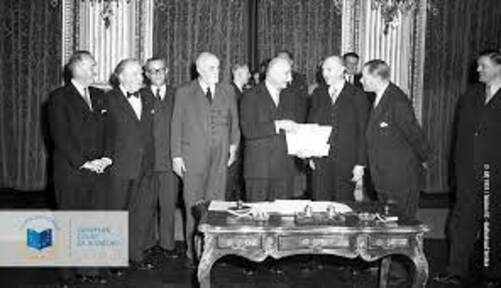Krugman on free trade:
‘In the early 20th century the British author Norman Angell published a famous book titled “The Great Illusion,” which declared that economic progress and growing world trade had made war obsolete. Nations, he argued, could no longer enrich themselves through conquest: Industrial workers couldn’t be exploited like peasants, and even small nations could prosper by importing raw materials and selling their wares on world markets. Furthermore, war between economically interdependent nations would be immensely costly even to the victors.
Angell wasn’t predicting the immediate end of war, which was good for his credibility, since the carnage of World War I was just around the corner. He was, however, hoping to persuade politicians to abandon their dreams of military glory. And an implication of his logic was that closer economic links among nations might promote peace.’
(…)
‘The road to the European Union began with the creation of the Coal and Steel Community, one of the goals of which was to create so much interdependence between France and Germany that a future European war would be impossible.’
(…)
‘So is this the end of peace through trade? Not exactly — but it’s a doctrine that has lost a lot of force lately, for several reasons.
First, the idea that trade fosters peace may be true only for democracies.’
(…)
‘And unfortunately, authoritarianism has been rising in many countries around the world for quite a while. That’s partly because some fragile democracies have collapsed, partly because some autocracies — especially China — have opened up economically although not politically and partly because some of these autocracies (again, especially China) have experienced rapid economic growth.
What about the idea that growing integration with the world economy would itself be a force for democratization? That idea was a key pillar of economic diplomacy in some Western nations, notably Germany, which bet heavily on the doctrine of Wandel durch Handel — transformation through trade. But even a glance at Vladimir Putin’s Russia or Xi Jinping’s China shows that this doctrine has failed: China began opening up to international trade more than 40 years ago, Russia 30 years ago, but neither shows any signs of becoming a democracy or even a nation with strong rule of law.’
(…)
‘Globalization can and has gone into retreat for extended periods when it loses policy support. Nor did we get here because economists persuaded politicians that free trade is good. Instead, the current world order largely reflects strategic considerations: Leaders, especially in the United States, believed that more or less free trade would make the world more amenable to our political values and safer for us as a nation.
But now even relatively internationalist policymakers, like officials in the Biden administration, aren’t sure about that. This is a very big change.’
Read the article here.
The analysis is probably largely right, but it stops where it gets difficult.
Fair enough, internationalist policy makers are not so convinced anymore that internationalism and free trade is the solution. Maybe the expectations were a tad too high? Remember Friedman and the McDonalds-doctrine. And now?
Germany’s policy of Handel durch Wandel was born out of necessity. The alternatives looked less appealing.
Biggest question, are the US and the EU ready for a trade war? A compromise will be reached in the last minute I guess. Free trade is not a miracle ointment but protectionism even less so.
